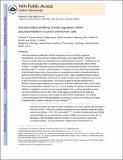| dc.contributor.author | Carlile, Thomas M. | |
| dc.contributor.author | Zinshteyn, Boris | |
| dc.contributor.author | Shin, Hakyung | |
| dc.contributor.author | Bartoli, Kristen Marie | |
| dc.contributor.author | Gilbert, Wendy | |
| dc.contributor.author | Rojas Duran, Maria Fernanda | |
| dc.date.accessioned | 2015-05-08T18:53:45Z | |
| dc.date.available | 2015-05-08T18:53:45Z | |
| dc.date.issued | 2014-09 | |
| dc.date.submitted | 2014-05 | |
| dc.identifier.issn | 0028-0836 | |
| dc.identifier.issn | 1476-4687 | |
| dc.identifier.uri | http://hdl.handle.net/1721.1/96947 | |
| dc.description.abstract | Post-transcriptional modification of RNA nucleosides occurs in all living organisms. Pseudouridine, the most abundant modified nucleoside in non-coding RNAs, enhances the function of transfer RNA and ribosomal RNA by stabilizing the RNA structure. Messenger RNAs were not known to contain pseudouridine, but artificial pseudouridylation dramatically affects mRNA function—it changes the genetic code by facilitating non-canonical base pairing in the ribosome decoding centre. However, without evidence of naturally occurring mRNA pseudouridylation, its physiological relevance was unclear. Here we present a comprehensive analysis of pseudouridylation in Saccharomyces cerevisiae and human RNAs using Pseudo-seq, a genome-wide, single-nucleotide-resolution method for pseudouridine identification. Pseudo-seq accurately identifies known modification sites as well as many novel sites in non-coding RNAs, and reveals hundreds of pseudouridylated sites in mRNAs. Genetic analysis allowed us to assign most of the new modification sites to one of seven conserved pseudouridine synthases, Pus1–4, 6, 7 and 9. Notably, the majority of pseudouridines in mRNA are regulated in response to environmental signals, such as nutrient deprivation in yeast and serum starvation in human cells. These results suggest a mechanism for the rapid and regulated rewiring of the genetic code through inducible mRNA modifications. Our findings reveal unanticipated roles for pseudouridylation and provide a resource for identifying the targets of pseudouridine synthases implicated in human disease. | en_US |
| dc.description.sponsorship | American Cancer Society (Robbie Sue Mudd Kidney Cancer Research Scholar Grant RSG-13-396-01-RMC) | en_US |
| dc.description.sponsorship | National Institutes of Health (U.S.) (GM094303) | en_US |
| dc.description.sponsorship | National Institutes of Health (U.S.) (GM081399) | en_US |
| dc.description.sponsorship | American Cancer Society. New England Division (Ellison Foundation Postdoctoral Fellowship) | en_US |
| dc.description.sponsorship | American Cancer Society (Postdoctoral Fellowship PF-13-319-01-RMC) | en_US |
| dc.description.sponsorship | National Institutes of Health (U.S.) (Pre-doctoral Training Grant T32GM007287) | en_US |
| dc.language.iso | en_US | |
| dc.publisher | Nature Publishing Group | en_US |
| dc.relation.isversionof | http://dx.doi.org/10.1038/nature13802 | en_US |
| dc.rights | Article is made available in accordance with the publisher's policy and may be subject to US copyright law. Please refer to the publisher's site for terms of use. | en_US |
| dc.source | PMC | en_US |
| dc.title | Pseudouridine profiling reveals regulated mRNA pseudouridylation in yeast and human cells | en_US |
| dc.type | Article | en_US |
| dc.identifier.citation | Carlile, Thomas M., Maria F. Rojas-Duran, Boris Zinshteyn, Hakyung Shin, Kristen M. Bartoli, and Wendy V. Gilbert. “Pseudouridine Profiling Reveals Regulated mRNA Pseudouridylation in Yeast and Human Cells.” Nature 515, no. 7525 (September 5, 2014): 143–146. | en_US |
| dc.contributor.department | Massachusetts Institute of Technology. Department of Biology | en_US |
| dc.contributor.mitauthor | Carlile, Thomas M. | en_US |
| dc.contributor.mitauthor | Rojas Duran, Maria F. | en_US |
| dc.contributor.mitauthor | Zinshteyn, Boris | en_US |
| dc.contributor.mitauthor | Shin, Hakyung | en_US |
| dc.contributor.mitauthor | Bartoli, Kristen Marie | en_US |
| dc.contributor.mitauthor | Gilbert, Wendy | en_US |
| dc.relation.journal | Nature | en_US |
| dc.eprint.version | Author's final manuscript | en_US |
| dc.type.uri | http://purl.org/eprint/type/JournalArticle | en_US |
| eprint.status | http://purl.org/eprint/status/PeerReviewed | en_US |
| dspace.orderedauthors | Carlile, Thomas M.; Rojas-Duran, Maria F.; Zinshteyn, Boris; Shin, Hakyung; Bartoli, Kristen M.; Gilbert, Wendy V. | en_US |
| dc.identifier.orcid | https://orcid.org/0000-0002-7699-9354 | |
| dc.identifier.orcid | https://orcid.org/0000-0003-0036-7307 | |
| dc.identifier.orcid | https://orcid.org/0000-0003-2807-9657 | |
| mit.license | PUBLISHER_POLICY | en_US |
| mit.metadata.status | Complete | |
